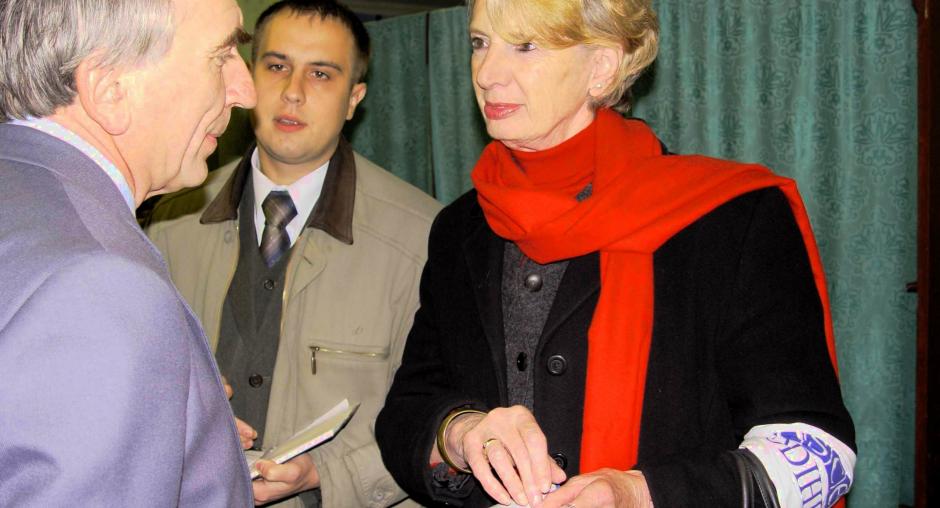Newsroom
Belarus elections fell significantly short of OSCE commitments
MINSK 18 October 2004

(OSCE)Head of the OSCE/ODIHR Election Observation Mission to Belarus, Amb. Audrey Glover (right), meets the chairperson of an election commission in Minsk during parliamentary elections, 17 October 2004. (OSCE) Photo details
MINSK, 18 October 2004 - The 17 October parliamentary elections in Belarus fell significantly short of OSCE commitments for democratic elections. The Belarusian authorities failed to ensure the fundamental conditions necessary for the will of the people to serve a basis for authority of government. Freedom of expression, association and assembly were seriously challenged. This calls into question the willingness of the authorities to respect the concept of political competition on a basis of equal treatment, concludes the OSCE Election Observation Mission in a statement, issued today.
Around 270 international observers from 38 countries observed the voting and counting on behalf of the OSCE Office for Democratic Institutions and Human Rights (ODIHR) and the OSCE Parliamentary Assembly.
"Democratic principles were largely disregarded by the authorities. Many candidates were actively excluded from registering or were deregistered, which limited the choice of voters," said Tone Tingsgaard, Vice-President of the OSCE Parliamentary Assembly, appointed by the OSCE Chairman-in-Office as the Special Co-ordinator for the Short-term observers. "Although we were here to observe the parliamentary elections, we found that the Referendum largely overshadowed the parliamentary election campaign."
Ambassador Audrey Glover, Head of the Long-term Observation Mission, deployed by the OSCE ODIHR added: "Equally worrying were police raids on campaign offices, the detention of a candidate, campaign workers and domestic observers, as well as numerous reports of coercion on certain groups, particularly students, to vote. The dominant influence of the State administration was apparent at all levels of the election process."
There were restrictive rules on campaigning, which were further exacerbated by instances of discrimination in favour of pro-government candidates and against the opposition. State media demonstrated a strong bias, portraying the opposition in overwhelmingly negative terms, while conducting an extensive campaign in favour of the incumbent political forces.
The Election Observation Mission believes that aspects that could have contributed positively to the process were the possibility for candidates to have a fixed amount of free television and radio airtime, and the possibility to print a statement free of charge in the state press. This was however not sufficient to address the overwhelming media imbalance. There was at least a minimal degree of competition in the majority of constituencies, but in ten constituencies there was only one candidate. The Election Commissions met all deadlines foreseen in the law.
Although not specifically observed, the Election Observation Mission noted that the scale of the Republican Referendum proposing the removal of the two-term limit on the office of the president, its unrestrained bias and its unregulated intrusion into polling stations contributed to a highly distorted campaign environment.
On election day the voting was generally assessed positively in around 9 out of 10 polling stations, although basic information was frequently withheld from observers. The counting proved very problematic, as the counting lacked transparency in the majority of polling stations observed. Numbers were not being announced aloud as they were being established, observers were only given a limited view of the process, and procedures for compilation of protocols were not followed. There were instances where observers noted that some early voting ballot boxed appeared to have been stuffed.
Around 270 international observers from 38 countries observed the voting and counting on behalf of the OSCE Office for Democratic Institutions and Human Rights (ODIHR) and the OSCE Parliamentary Assembly.
"Democratic principles were largely disregarded by the authorities. Many candidates were actively excluded from registering or were deregistered, which limited the choice of voters," said Tone Tingsgaard, Vice-President of the OSCE Parliamentary Assembly, appointed by the OSCE Chairman-in-Office as the Special Co-ordinator for the Short-term observers. "Although we were here to observe the parliamentary elections, we found that the Referendum largely overshadowed the parliamentary election campaign."
Ambassador Audrey Glover, Head of the Long-term Observation Mission, deployed by the OSCE ODIHR added: "Equally worrying were police raids on campaign offices, the detention of a candidate, campaign workers and domestic observers, as well as numerous reports of coercion on certain groups, particularly students, to vote. The dominant influence of the State administration was apparent at all levels of the election process."
There were restrictive rules on campaigning, which were further exacerbated by instances of discrimination in favour of pro-government candidates and against the opposition. State media demonstrated a strong bias, portraying the opposition in overwhelmingly negative terms, while conducting an extensive campaign in favour of the incumbent political forces.
The Election Observation Mission believes that aspects that could have contributed positively to the process were the possibility for candidates to have a fixed amount of free television and radio airtime, and the possibility to print a statement free of charge in the state press. This was however not sufficient to address the overwhelming media imbalance. There was at least a minimal degree of competition in the majority of constituencies, but in ten constituencies there was only one candidate. The Election Commissions met all deadlines foreseen in the law.
Although not specifically observed, the Election Observation Mission noted that the scale of the Republican Referendum proposing the removal of the two-term limit on the office of the president, its unrestrained bias and its unregulated intrusion into polling stations contributed to a highly distorted campaign environment.
On election day the voting was generally assessed positively in around 9 out of 10 polling stations, although basic information was frequently withheld from observers. The counting proved very problematic, as the counting lacked transparency in the majority of polling stations observed. Numbers were not being announced aloud as they were being established, observers were only given a limited view of the process, and procedures for compilation of protocols were not followed. There were instances where observers noted that some early voting ballot boxed appeared to have been stuffed.
